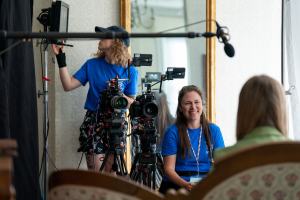As America grapples with the latest in a way-too-long series of Most Important Presidential Election Years in Our Lifetime, democracy and its fundamental building blocks – governance, consensus, civil discourse, the rule of law, the balance of power – face an equally foreboding precarity. Boomers and Gen-Xers ask themselves, How did we get here?, and turn to Millennials and Gen-Zers for hope.
The Girls and Boys State programs have, for nearly 90 years and in all 50 states, been in the business of cultivating and nurturing the next generation of leaders through intensive, week-long immersion programs in government and politics. Directors/producers/life partners Jesse Moss and Amanda McBaine were drawn to this idea of twin crucibles – the program itself and adolescence – to explore their confluences of ideological inquiry amid a politically tumultuous time and the coming-of-age dynamic between private values and public personae. The Emmy-winning Boys State, released in 2020 through Apple TV+, gave viewers a glimpse into what democracy looks like through teenage eyes. Girls State was the logical next step – although The Mission, which McBaine and Moss directed, and War Game, which Moss made with Tony Gerber, would precede that film. With Concordia Studio and Apple TV+ on board as executive producers and distributors, respectively, Moss and McBaine took their production team to Missouri (Boys State took place in Texas). Missouri Girls State and Boys State happened concurrently on the campus of Lindenwood University, but were run independently of each other.
Director-producer Amanda McBaine behind-the-scenes of ‘Girls State’
Apple TV+
The production model for Boys State – multiple crews working long hours following multiple participants – served the filmmakers well in their planning process for Girls State, where they retained seven camera crews, while upping the number of sound recordists, all of whom worked up to 14 hours per day – with the proviso that a majority of the cinematographers and sound recordists be women.
While one might be tempted to envision Girls State as a sequel to Boys State, the Moss-McBaine team are careful not to categorize it as such. “We like to talk about it as a sibling,” McBaine asserts. “We were afraid to make a film that we knew was going to be compared to another film that we felt worked and did well. But we also knew that we couldn’t not make Girls State; we were thinking about Girls State while we were making Boys State.
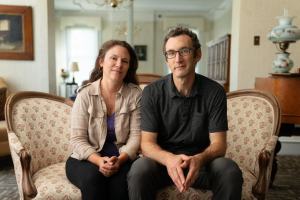
Directors Amanda McBaine and Jesse Moss
Apple TV+
“Girls do have some particular challenges with representational democracy that boys do not,” McBaine continues. “They are not as represented in the real world and real-world politics. We knew Roe v. Wade was on the mind of many girls in America. So those were special facts going into Girls State in 2022. What we recognized very quickly while we were there is that it had a different vibe. It was a different time; we were now on the other side of the pandemic, so kids were interacting in a different way. And girls do government differently. That was interesting to investigate.”
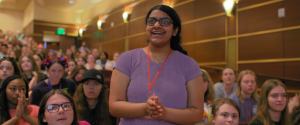
Nisha Murali in ‘Girls State’
Apple TV+
“One way to release ourselves from the burden of those expectations was to move states,” Moss adds. “Missouri is not a battleground state, but it’s politically contradictory in some ways: [Sen.] Josh Hawley here, [Rep.] Cori Bush there; rural, urban. Just going somewhere else helped wipe the slate clean. Also going in, there were certain similar assumptions, certain shared DNA, the same program, the same sort of general confines of how the week is run—but immediately thinking that we could have more voices in the film. And that came out of production, mostly. But even in casting, we recognized that we didn’t need to arbitrarily restrict our focus to a small number. We thought, ‘Could we make an ensemble piece?’”
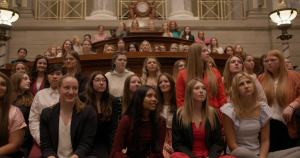
Participants in Missouri’s Girls State
Apple TV+
The “casting” process for Girls State entailed combing through the hundreds of participants in the program, interviewing some on Zoom, then some in person. The filmmaking team was looking for cultural, ideological and regional diversity, for sure, but also the sweet spot between confidence and vulnerability, when reconciliation between still-forming values, principles and ethics with your public-facing self is an ongoing challenge. One of the more epitomizing admissions in the film came from participant Nisha Murali: “We’re working hard on an image that we want to show the world—and it’s exhausting.”
“Because part of our investigation is, ‘What’s going on with our divided country?,’ we knew we needed kids from both sides of the political divide,” McBaine maintains. “But for us, it was really who in our conversations were themselves. These were critical thinkers, who were passionate about politics, knew and cared about American government, and were emotionally intelligent in the sense that they knew themselves, but could also share themselves with us, and were willing to go on this journey with us as collaborators.”

Emily Worthmore in ‘Girls State’
Apple TV+
Moss and McBaine settled on their ensemble cast of seven, but Emily Worthmore nonetheless emerges as the de facto lead. When we first meet her, she’s full of bluster, bravado and hyper over-achievement, barely settling into her dorm room before launching her campaign for governor. But over time, she betrays a self-consciousness about being conservative and Christian, then her insecurities and vulnerabilities surface. It’s as if, in the classic big fish/small pond-small fish/big pond transition, she had never faced the kinds of challenges that an environment like Girl State poses. She stumbles through her stump speech, fails to connect with her audience, and she loses the election. As one of her colleagues consoles her, “Don’t feel you have to be so perfect.”
Humbled and hurt, she nonetheless bounces back, turning to Career Goal #2: journalism. In a matter of days, she launches into an investigative piece about the glaring inequalities and inequities between Missouri’s Boys State and Girls State, which gets published in the programs’ newsletter. And at the end of the week, she earns a scholarship.
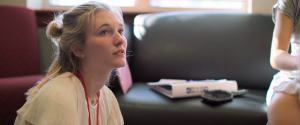
Emily Worthmore in ‘Girls State’
Apple TV+
“It’s the joy and wonder of unscripted filmmaking, to follow somebody who you think is one thing and becomes another,” Moss notes. “To recognize there was within her all of those strong forces, and to see her fail and reveal something to us and to herself about her true destiny is the power of the film, to some extent: in failure is this resurrection. And what makes these intense, coming-of-age experiences is to see your true self and the limitations of perhaps who you thought you were—but also what your superpower really is.
“We can admire the rigor of her journalism,” Moss continues. “The questions she asks, how well she does it, how important that conversation is. The fact that she becomes the feminist voice of this film is kind of remarkable”.
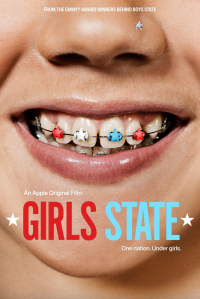
Apple TV+
“Emily’s willingness to sit and have engaged conversations with people whose politics are diametrically opposed to hers is pretty special,” McBaine asserts. “I think that’s why we keep returning to these spaces: As old fashioned as they are, they do create this moment for all these kids to work it out with one another.”
Emily had checked with one of the protagonists from Boys State about his experience both in being in the film and in working with the filmmakers; the directors, in turn, later shared a rough cut of Girls State with her and the other participants. Moss and McBaine also established a rapport with the respective parents. And the feedback was generally positive. “I think seeing that other girls were sharing their vulnerability and also being models of strength helps to see them as part of a larger whole, like a choral performance,” Moss notes.
“Vulnerable moments in isolation are hard,” Moss continues. “You imagine how we see them, how an audience might see them. And not until you can experience those moments with a big audience do you really understand their power and why they’re not gratuitous.”
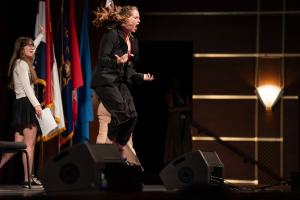
Cecilia Bartin in ‘Girls State’
Apple TV+
Girls State is a safe space, a nurturer and cultivator of female empowerment that provides the tools for young women to go out and change a world where female representation in government and elsewhere falls short. But what about the idea of a co-ed State program, where participants and their supervisors might be able to shape a more civil paradigm for the democratic process than what we see on CSPAN? Well, after 85 years, the State programs launched its first co-ed version in 2023, in Sacramento, California.
“It’d be such an inviting laboratory to explore a co-ed space with politically activated 17-year-olds,” Moss admits. “I’m encouraged that these programs are beginning to integrate, and I do think that is the future. I don’t know if there’s another way to spend time with 17-year-olds. They’re so politically active in ways outside of these camps too that’s exciting. We are living through this campus protest movement moment. And that’s very much real politics, with real stakes for everyone involved. But containment is what these [State] programs offered us as storytellers that was so thrilling. And I think I’d still be looking for that, as far as to say what we’re looking for as filmmakers.”

